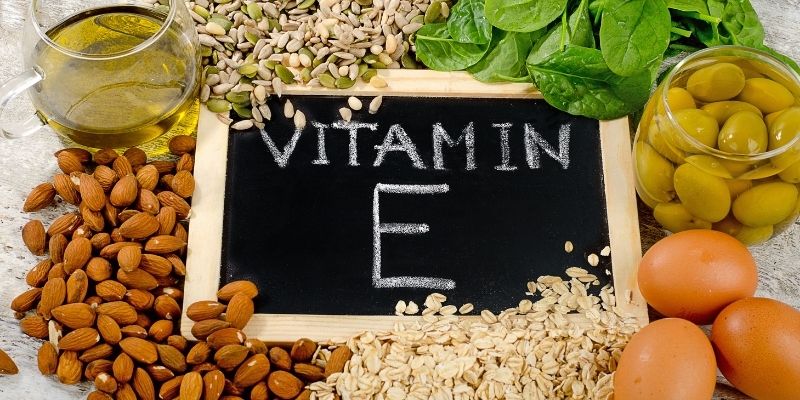Why is Vitamin E so important?
Vitamin E is probably one of the most underrated molecules despite its protective and even restorative properties. Other vitamins such as Vit. C, or the Vit. B group take a prominent place in the nutrition research, but Vit. E has become an increasing subject of study to understand its extraordinary properties better.
A recent study by Schirinzi et al. from the University of Rome, showed not only the protective effects of Vit. E, but also that continuous administration of Vitamin E (alpha-tocopherol) fully restored corticostriatal synaptic plasticity in a preclinical model. Consequently, Vit. E must have a specific protective action that positively affects mitochondrial impairment, reverting some central steps of the pathogenic processes, in the case of the mentioned study, in Parkinson’s disease.
Vitamine E can become an authentic game changer for those who do not only want to observe a more or less rapid degeneration of their body but also help it actively to remain protected against oxidative stress.
By which mechanism Vit. E protects against Neurodegeneration?
It is interesting to understand how degenerative processes occur in our organism. During normal respiration, our body produces ROS (reactive oxygen species). But what are ROS and free radicals, and why are they so harmful to our organism?
Free radicals produce oxidative damage, meaning they are imbalanced in electrons, and destroy healthy cells, tissues, and organs, including the brain, by “stealing” their electrons!
Vitamin E is a highly potent antioxidant with electrons to give! This is helping to deactivate and neutralize the dangerous free radicals that destroy our bodies. Also, the reduced oxidation subsequently reduces the chronic inflammatory cascade.
With aging, vitamin E supplementation can be highly indicated, as the human organism progressively loses its natural ability to fight oxidation, with the consequence of enhancing chronic inflammatory processes and aging and degeneration of our organism. So, supplementation with Vit. E should be considered, especially for people having degenerative conditions. T. Schirinzi and collaborators from the University of Rome showed these significant effects of vitamin E and its benefits against degenerative processes.
Where do we find Vitamin E to help our body fight oxidative stress?
Vitamin E occurs in different chemical forms, and alpha-tocopherol is the one that best fits the dietary needs of the human organism. In the food supplement AtremoPlus, Alpha-Tocopherol of 100% natural origin is used at the daily recommended dosage.
Vitamin E can also be found in plants and several products of our diet, including nuts, seeds, sunflowers, and green vegetables.
It is interesting to note that the regulator of the European Union, based on knowledge and the scientific studies published so far, allows the use of the claim that Vitamin E contributes to protecting the cells against oxidative damage.
The high antioxidative properties of vitamin E are highly favorable to slowing down degeneration due to oxidative destruction of healthy tissues.
Vitamin E helps even to have better-looking skin. Skin is indeed exposed to many environmental stressors and can benefit from the strong anti-oxidant power of Vitamin E.
Could vitamin E benefit people suffering from degenerative processes in their organism?
Interestingly, T. Schirinzi and collaborators performed both a clinical and experimental study assessing the benefits of vitamin E supplementation in one of the groups. They found that a higher dietary intake of vitamin E significantly reduced the occurrence of degenerative problems, such as Parkinson’s, and found a decisive, protective action of vitamin E for people affected by oxidative damage.
To conclude, vitamin E is a nutrient your body needs to stay healthy and protect against free radicals. As such, food supplements rich in vitamin E may help to reduce degenerative oxidative processes in the body.
Note: AtremoPlus is manufactured out of the Vicia Faba L plant. It contains vitamin E at the daily recommended dose combined with many other vitamins, minerals, polyphenols, flavonoids, and amino acids that are beneficial to maintain essential processes in the organism.
Do you want to share this important information with your friends or family? Just click on the bottom below to choose the network.
Thanks for sharing 😀
By clicking here below, I understand that I’m leaving this information website to go to the external website:
Disclaimer:
Please note that this blog provides information about our food supplement AtremoPlus and related topics. This blog is NOT intended to provide medical advice.
If you have any medical questions, please contact your healthcare professional.
References:
Tommaso Schirinzi and others, ‘Dietary Vitamin E as a Protective Factor….: Clinical and Experimental Evidence’, Frontiers in Neurology, 10.February (2019), 1–7
Jiang, Q. Natural forms of vitamin E: Metabolism, antioxidant, and anti-inflammatory activities and their role in disease prevention and therapy. Free Radic. Biol. Med. 2014, 72, 76–90.
Lee, P.; Ulatowski, L.M. Vitamin E: Mechanism of transport and regulation in the CNS. IUBMB Life 2019, 71, 424–429.
Zingg, J.M. Vitamin E: A Role in Signal Transduction. Annu. Rev. Nutr. 2015, 35, 135–173.
Kanchi, M.M.; Shanmugam, M.K.; Rane, G.; Sethi, G.; Kumar, A.P. Tocotrienols: The unsaturated sidekick shifting new paradigms in vitamin E therapeutics. Drug Discov. Today 2017, 22, 1765–1781.
Giraldo, E.; Lloret, A.; Fuchsberger, T.; Viña, J. Aβ and tau toxicities in Alzheimer’s are linked via oxidative stress-induced p38 activation: Protective role of vitamin E. Redox Biol. 2014, 2, 873–877.
Fukui, K.; Kawakami, H.; Honjo, T.; Ogasawara, R.; Takatsu, H.; Shinkai, T.; Koike, T.; Urano, S. Vitamin E deficiency induces axonal degeneration in mouse hippocampal neurons. J. Nutr. Sci. Vitaminol. 2012, 58, 377–383.
Li, Y.; Liu, L.; Barger, S.W.; Mrak, R.E.; Griffin, W.S. Vitamin E suppression of microglial activation is neuroprotective. J. Neurosci. Res. 2001, 66, 163–170.
